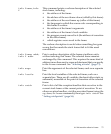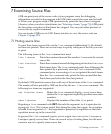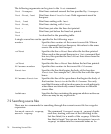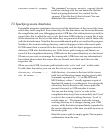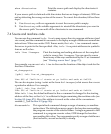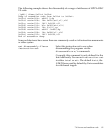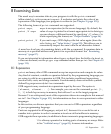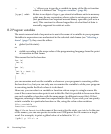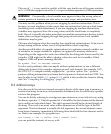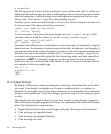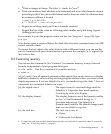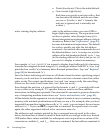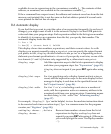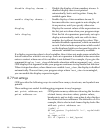
8 Examining Data
The usual way to examine data in your program is with the print command
(abbreviated p), or its synonym inspect. It evaluates and prints the value of an
expression of the language your program is written in (see Chapter 9 (page 101)).
The following forms of print command are supported:
print expr,
print /f expr
expr is an expression (in the source language). By default, the
value of expr is printed in a format appropriate to its data type;
you can choose a different format by specifying '/f', where f is
a letter specifying the format; see “Output formats” (page 86).
print, print /f If you omit expr, GDB displays the last value again (from the
value history; see “Value history” (page 95)). This allows you to
conveniently inspect the same value in an alternative format.
A more low-level way of examining data is with the x command. It examines data in
memory at a specified address and prints it in a specified format. See “Examining
memory” (page 87).
If you are interested in information about types, or about how the fields of a struct or
a class are declared, use the ptype exp command rather than print. See Chapter 10
(page 115).
8.1 Expressions
print and many other GDB commands accept an expression and compute its value.
Any kind of constant, variable or operator defined by the programming language you
are using is valid in an expression in GDB. This includes conditional expressions,
function calls, casts, and string constants. It unfortunately does not include symbols
defined by preprocessor #define commands.
GDB supports array constants in expressions input by the user. The syntax is
{element, element. . .}. For example, you can use the command print {1,
2, 3} to build up an array in memory that calls malloc in the target program.
Because C is so widespread, most of the expressions shown in examples in this manual
are in C. See Chapter 9 (page 101), for information on how to use expressions in other
languages.
In this section, we discuss operators that you can use in GDB expressions regardless
of your programming language.
Casts are supported in all languages, not just in C, because it is so useful to cast a
number into a pointer in order to examine a structure at that address in memory.
GDB supports these operators, in addition to those common to programming languages:
@ '@' is a binary operator for treating parts of memory as arrays. Refer
to See “Artificial arrays” (page 85), for more information.
8.1 Expressions 83



